A couple of days ago, Warriors, I shared some news about the ESSA assessments.
Today’s article will give you some of the information and research you need to know in order to understand the name game that the CCSS Machine is playing with us.
A Hidden “Gem”:
Where we left off: U.S. PIE and their team’s worthy efforts of exposing the deceptions surrounding the innovative moves in the works for testing our students.
Among some of the evidence revealed by that team of volunteer parents for U.S. PIE, was the use of the word ‘modular’ in the language describing the ‘innovations’ ESSA’s assessments are bringing us.
From page 6 of the U.S. Dept. of Ed’s Assessment document proposing all the assessment changes (http://www2.ed.gov/policy/elsec/leg/essa/nprmassessementfedreg1b.pdf)
“We also note that, under part A of title I of the ESEA, as amended by the ESSA, States have the flexibility to use computer-adaptive statewide assessments, to administer a single summative statewide assessment, or to offer multiple statewide interim assessments during the course of the academic year that result in a single summative score and provides valid, reliable, and transparent information on student achievement (e.g., modular assessments).”
I urge you, if you haven’t seen this document, to read it. While the excerpt sounds like States will have some choices, they won’t.
Here are some synonyms for ‘modular’, see if you recognize any of them from CCSS Machine propaganda.
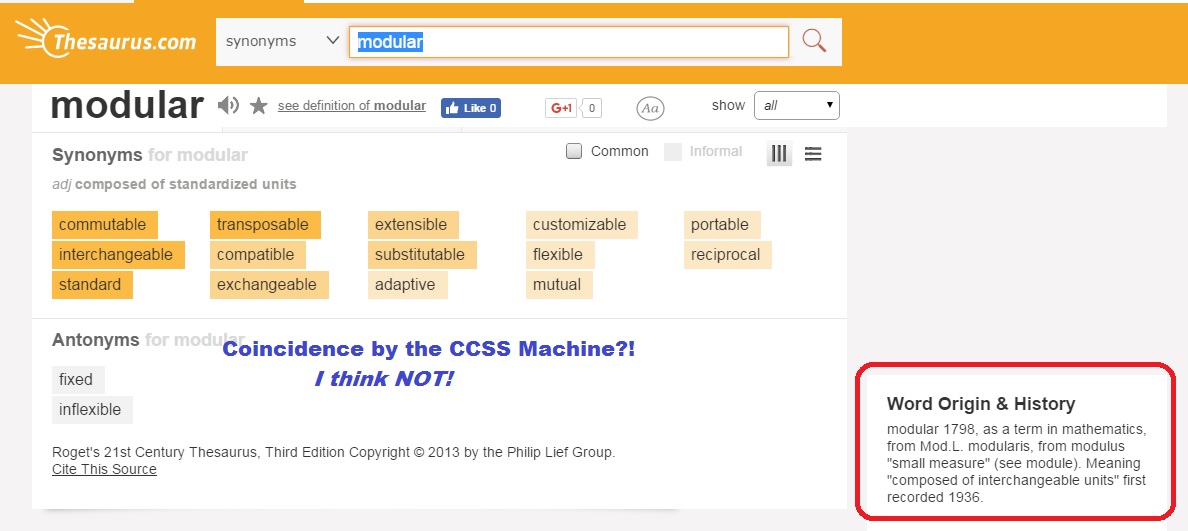
2010, An International Paper by ‘Educrats’:
Here’s a screen shot of the 7 page paper, notice the word ‘flexible’ in context with assessments. Notice the international influences for education.
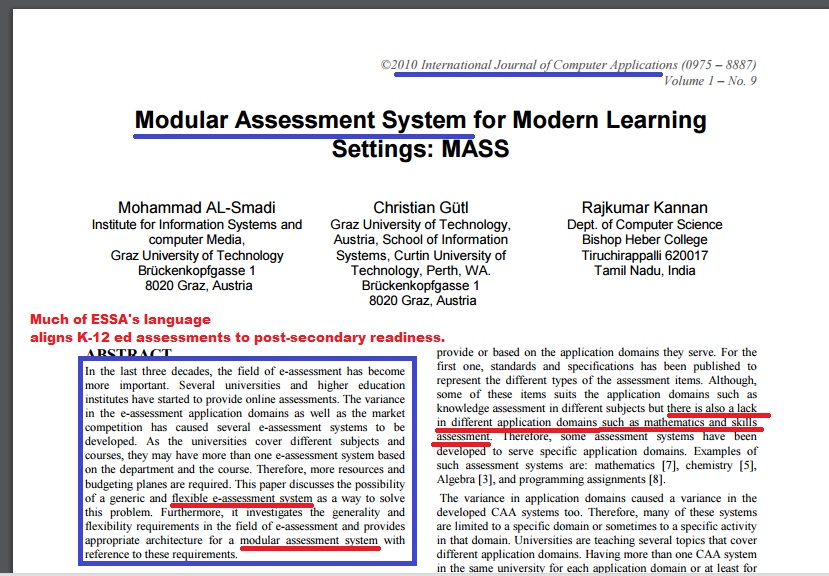
So why did I use the word ‘educrat’ to describe the authors?
Prof. AL-Smadi is a “Google Scholar”. As we know, Google’s a huge CCSS Machine member organization.Visit his “Google Scholar” page and you’ll see tons of works/studies on assessments for students. (https://scholar.google.com/citations?user=im_3CvwAAAAJ) Now, simply being a “Google Scholar” doesn’t make this professor an educrat. No, in my research, when folks willingly and knowingly work for or promote any part of the CCSS Machine, that qualifies them.
So, what else has Prof. AL_Smadi participated in? “Learning Layers”, a global career-clusters-like project. ‘Career Clusters’, by the way are a part of the CCSS Machine for students of all ages. It’s also a “7th Framework Programme”. What is blue blazes is THAT?!
“7th Framework Programme” was a part of the European Commission. CORDIS is where old “7th Framework Programme” projects are archived. (See: http://cordis.europa.eu/fp7/)
So, what’s the big deal? The Learning Layers project the Professor worked with is responsible for the “Learning Toolbox”. What’s the “Learning Toolbox”? A work-based education tool. See the “Learning Layers” blog: http://learning-layers.eu/news/
Now, Warriors, try an internet search on your own for ‘learning toolboxes’. See my example below,
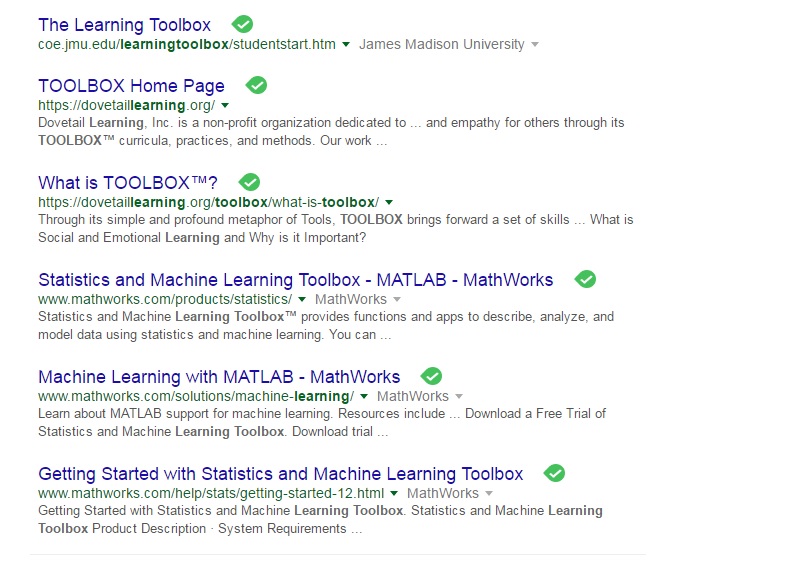
Then, try a search for ‘digital learning toolboxes’. You’ll be sadly amazed.
What about the other professors? Prof. Guelt is also a cited Google Scholar. He, too, is deep into ‘adaptive’ assessments. See his Google Scholar page:
https://scholar.google.at/citations?user=NoAiKpcAAAAJ&hl=en
Prof. Guelt is also involved in Global Education/Learning, especially for engineering. See his website: http://www.iicm.tugraz.at/guetl
The last professor, Prof. Kannan, is a Google Scholar, too! His Google Scholar page:
https://scholar.google.com/citations?user=1nkvdhMAAAAJ&hl=en
His expertise is in data mining and human-to-computer-interaction. See:
https://www.researchgate.net/profile/Rajkumar_Kannan3
The 7 page paper these 3 Scholars wrote discussed why 21st Century assessments via computer (e-assessing) was (is) such a promising field.
If you noticed in the screen shot of their work, ‘modular assessments’ was used. If you read the rest of the paper, you’ll see the separate domains of effectiveness, the alignment of the education and/or assessment standards to be used in these electronic tests, and MORE. http://www.ijcaonline.org/journal/number9/pxc387342.pdf
**If you still unsure how ‘modular assessing’ works, this simple definition for modular assessing, “A modular course is defined as a part of the main course that can stand alone. The topics are related and when combined with all other parts, become the entire course. Modular courses may not exist without the main course. Some modules may be self-paced. Classes may be offered as faculty lectures, on Web, using CDs, on campus, off campus, or a combination of all of the above with an exam at the end of each module. Modular courses run full term; modules may or may not run full term.”
I found this on the Oregon State University website,
http://newdesigns.oregonstate.edu/admin/aa/apaa/modular-courses
**Remember, ESSA’s language mandates that all education, including assessments, must be streamlined to post-secondary readiness; that standards be aligned to what higher ed uses, SO by using ‘modular assessments’, it is easier to force alignment in testing/teaching.
A Stop in Cambridge:
From a report that appears to be from 2011,
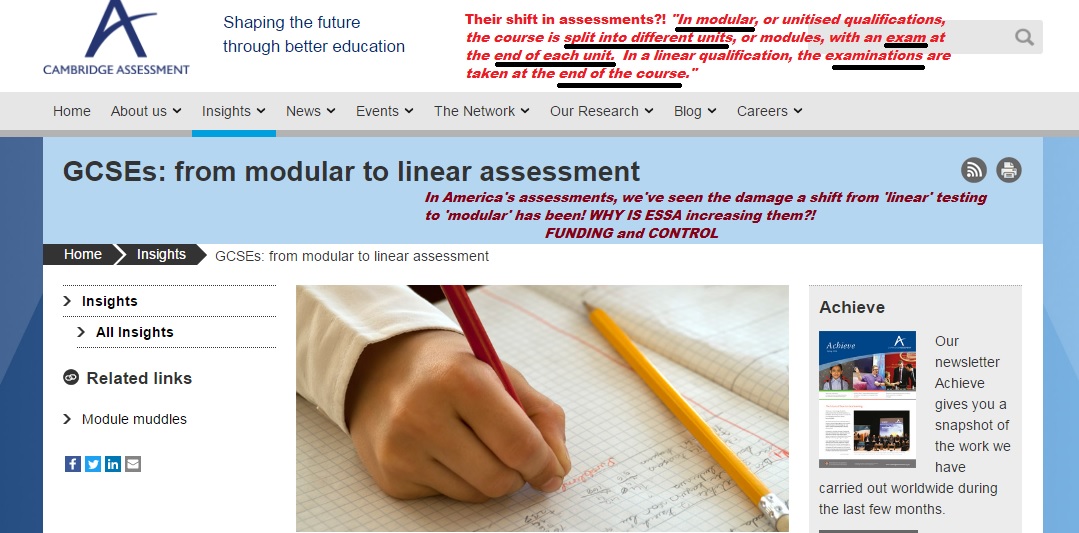
Why pay attention to Cambridge’s findings?! Consider the global shift in education. Wherever education is, assessments will also be! Consider the American demise of shifting from one type of harmful assessing to another type.
What is interesting is that Cambridge found different students need different assessments. To see the 2005 Cambridge study of the Effects of Modularized Assessing:
http://www.cambridgeassessment.org.uk/Images/122773-effects-of-modularisation.pdf
So, how does ESSA propose to improve testing?! “Innovative assessments”. The ‘innovation’, however, is MORE e-assessing, MORE data mining. How? Modular testing systems!
Warriors, if you aren’t sure how the international information ties into ESSA, see below:
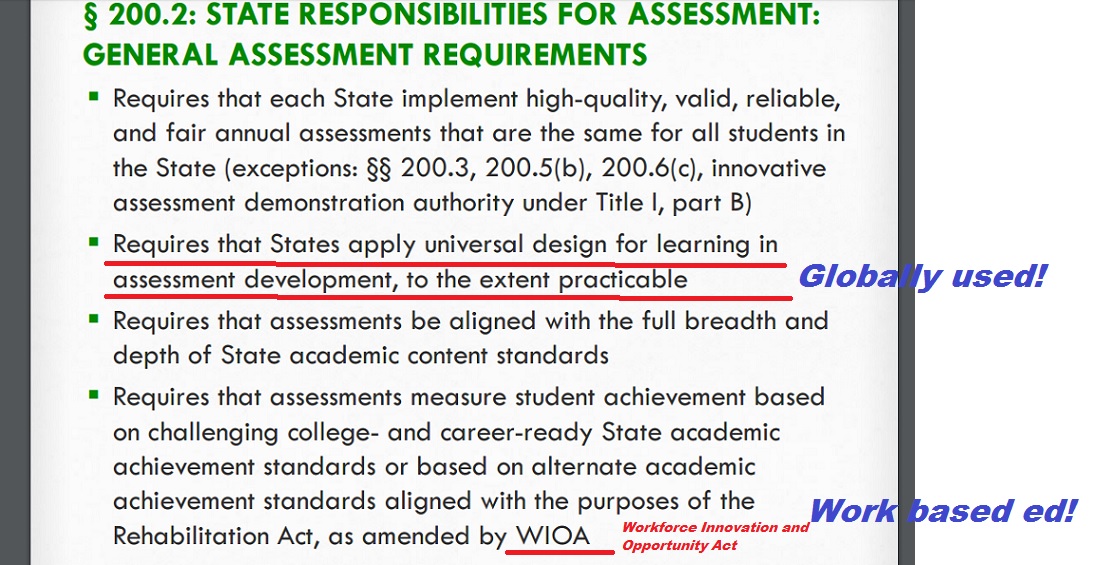
Remember, those experts above have been working non-stop (so have scores of other CCSS Machine members) to make sure those modular assessments fit the requirements. Shamefully, Congress, the CCSS Machine, and others made sure this shift was embedded in ESSA.
Heading to New York:
By this time, I was gasping at all that was unfolding before my eyes. But, there’s more…. somehow in searching, this kept popping up: EngageNY. What you see below is a small sample of modular assessing.
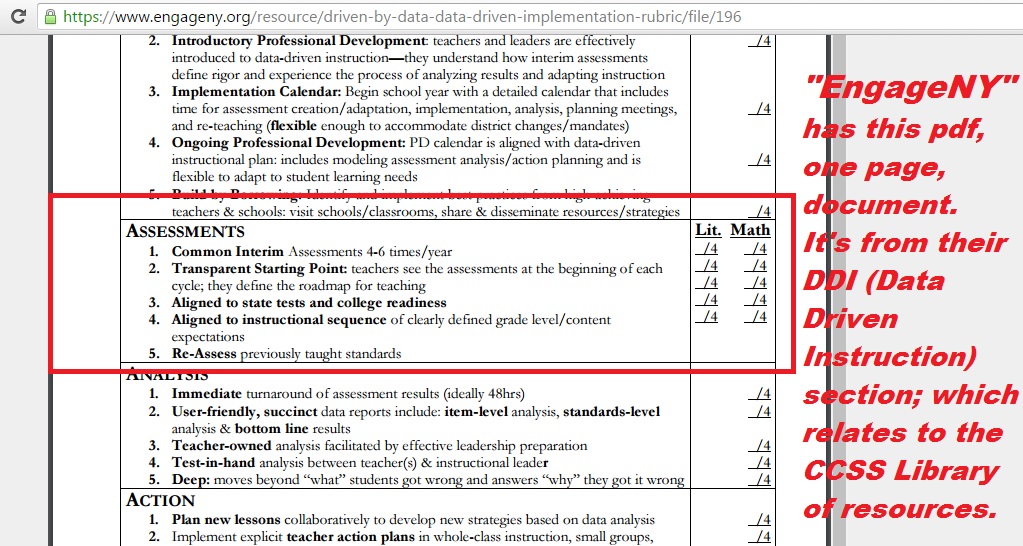
If you would like to see the entire one page document for more modular/digital mess:
https://www.engageny.org/resource/driven-by-data-data-driven-implementation-rubric/file/196
According to EngageNY, the source for the rubric is “Paul Bambrick-Santoyo’s Driven By Data: A Practical Guide to Improve Instruction”.
This link will show you how many assessments schedules and resources are already in place for the modular/digital ‘innovative upgrades’:
https://www.engageny.org/resource/data-driven-instruction-sample-assessments-and-resources
**Consider this, while the schedules already in place are dated, they will only increase via ESSA, NOT decrease. You can be sure that Paul Bambrick-Santoyo and many others like him have already been tagged by the CCSS Machine to help with the innovative/modular assessing ESSA will deliver.
Who the heck is Bambrick-Santoyo anyway?! He’s with “UnCommon Schools”. But, that’s not all:
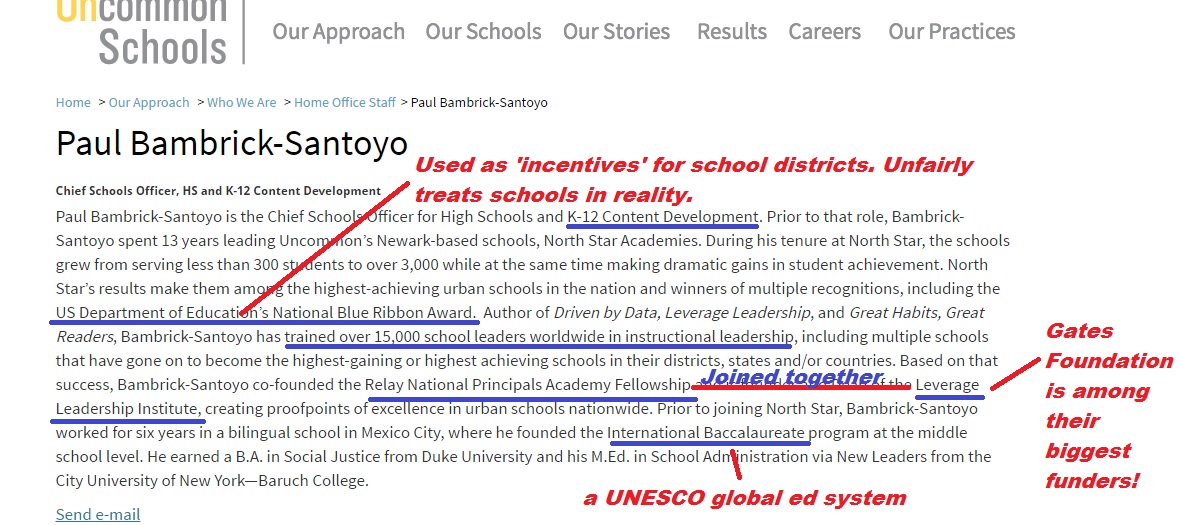
To see the Uncommon Schools website: http://www.uncommonschools.org/
To see the Relay/Leverage partners: http://www.relay.edu/about/partners
If you’d like to see Bambrick-Santoyo’s work for data mining, etc. I found his research at the University of IL. Just wait until you see the collection of research for digital assessments UofIL has.
See: http://education.illinoisstate.edu/search/?site=isu_collection&client=default_frontend&clientID=COE&as_sitesearch=education.illinoisstate.edu&output=xml_no_dtd&filter=p&oe=UTF8&q=data%20improve
While Bambrick-Santoyo didn’t contribute to this ESSA paper, you need to get this one. It is detailing the focus ESSA will put on school leaders, especially principals. Be sure to read it all, including the footnotes.
http://education.illinoisstate.edu/downloads/csep/policypapers/ESSA%20White%20Pape.pdf
Related information:
The CA CORE Districts data driven assessment/modular information (circa 2013):
http://coredistricts.org/our-work/standards-and-data-assessments/
If you want to see how they are stepping in line with ESSA:
http://coredistricts.org/category/news-room/in-the-news/
The latest on modular/digital assessing and ESSA from Learning Forward:
https://learningforward.org/docs/default-source/pdf/leveraging-essa-for-effective-pl-systems.pdf?sfvrsn=2
How classroom data could be used against those assessed:
https://www.mathematica-mpr.com/commentary/to-do-essa-accountability-right-focus-on-classrooms-not-just-schools
From Data Quality Campaign (a huge CCSS Machine member organization), their ‘feel good’ data mining video:
[youtube https://www.youtube.com/watch?v=cgrfiPvwDBw&w=560&h=315]
Closing:
If you haven’t contacted the U.S. Congress yet, please do! ESSA’s innovation is the ruin of our nation. Join the U.S. PIE’s Twitter Rally set for 9/12/16, from 7 pm to 9pm. Here’s the link: http://patriotjournalist.com/RTTT2Action.php?v=0&src=Schedule
Bonus: you can tweet anytime! Each tweet goes to the Congress by Chambers AND by ed/workforce committees!
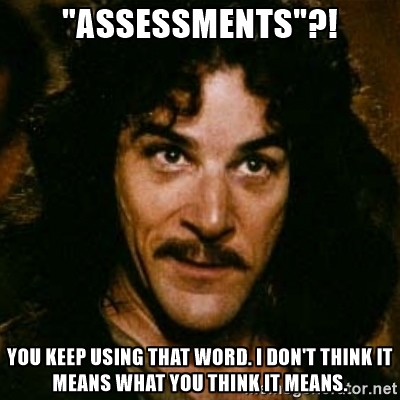


1 thought on “S.O.S Assessments, Pt. 2”